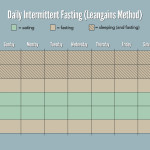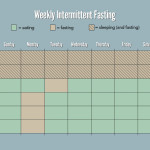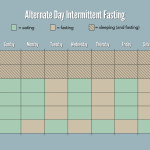 By: Calum McLellan, CISSN, CSCS, NASM-PES
By: Calum McLellan, CISSN, CSCS, NASM-PESSports Nutritionist and Sports Performance Specialist
SPECTRUM, Inc
“In other words, I’m stronger, leaner, and more explosive even though I go to the gym less and eat less.” –James Clear
James Clear, is a writer and researcher on behavioral psychology, habit formation, and performance improvement, and I couldn’t agree more with him. Since adopting a lifestyle using intermittent fasting (IF) I have been able to effectively manage my body composition to stay lean while increasing muscle and strength. Coming off of a ketogenic diet for several months, I wanted something that would be an easy alternative to dieting while maintaining the leanness I achieved while using the keto diet. Intermittent fasting has proven itself to be the answer to that and it could be an easy addition to your current diet regimen to take you to the next level of fitness or body composition goals. I have compiled a list of ten things you should know about intermittent fasting from the leading nutrition professionals in the world, to further your knowledge on the subject. At Spectrum we offer habit based nutrition coaching and intermittent fasting is sometimes a tool I will use to push a client through to their specific goals. If you would like more in-depth, personal help with intermittent fasting or other nutrition needs set up a free consultation today through our front desk to see how Spectrum Fuel can change your life!
1) What is it?
Periods of not eating- can be as little as 12 hours and as long as 24 hours.



As part of a weight management or weight loss program.
3) Who does it benefit?
Someone looking for a manageable fix to dieting for a busy schedule, and someone low on time and preparation.
-1. Intermittent fasting makes your day simpler.
-2. Intermittent fasting helps you live longer.
-3. Intermittent fasting may reduce the risk of cancer.
4) Why does it work?
Learn how to manage hunger more efficiently, controlling caloric intake, and possibly create caloric intake.
5) What does it do?
• Intermittent fasting can help you lose weight and belly fat
• Intermittent fasting can reduce insulin resistance, lowering your risk of type 2 diabetes
• Intermittent fasting can reduce oxidative stress and inflammation in the body
(http://authoritynutrition.com/10-health-benefits-of-intermittent-fasting)
6) What can I have during my fast?
Water, carbonated water, BLACK coffee, calorie free drinks (unsweet tea)
7) What should I break my fast with?
High protein meal (i.e salad with animal protein: meat, dairy, eggs, protein powder shake)
8) Do I need to be aware of the calories I consume after my fast?
Yes and no… Because you have been fasting for a large portion of the day, your appetite will inherently be lower, but you still need to be careful that you don’t over eat for your specific goals, maintenance, and weight loss.
9) Workouts?
If you workout first thing in the morning, it may not be the best option for you because workout nutrition is more vital than having a pre and post work out blast of nutrition
10) Take home message:
Learn how to manage hunger more efficiently, controlling caloric intake. Intermittent fasting can work but it’s not for everyone, nor does it need to be. In the end, it is just one approach, among many effective ones, for improving health, performance, and body composition (PN). The Daily Fast will typically be much harder to adhere to for men over 15% body fat and women over 22% body fat. Furthermore, there are far easier ways to make rapid and lasting change for people in those categories.
See “How to get in shape without fasting” below. (http://www.precisionnutrition.com/intermittent-fasting/summary)
Leave a Reply